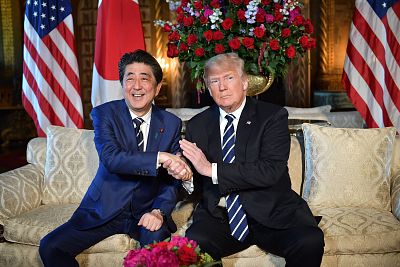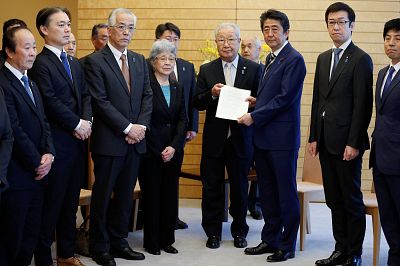"The Japanese people should be concerned about slight differences of priorities between the United States and Japan," one professor said.
TOKYO — President Donald Trump has suggested that his highly anticipated meeting with North Korean leader Kim Jong Un might result in "the greatest deal for the world."
But here in Tokyo, the government is worried about the possibility of Trump striking an agreement to curtail the North's ability to hit the U.S. mainland without addressing the shorter-range missiles that can reach Japan.
Prime Minister Shinzo Abe also wants pressure put on Pyongyang to return Japanese nationals who were abducted by North Korean agents decades ago.
Trump is expected to raise the abduction issue when he meets with Kim in late May or early June, although the main focus is still expected to be the regime's nuclear and ballistic missile programs.
"The Japanese people should be concerned about slight differences of priorities between the United States and Japan," said Mieko Nakabayashi, a professor in U.S.-Japan relations at Waseda University in Tokyo.
Japan, she said, was "watching very carefully" to see whether Trump would pursue the same objective of Kim giving up his nuclear program and weapons, or whether he might be attracted to a more flexible deal based on U.S. domestic political considerations. While Kim signed a declaration Friday agreeing to the "complete denuclearization" of the Korean Peninsula, the details and timeline remain unclear.
Abe has been one of the most vocal supporters of Trump's "maximum pressure" campaign against North Korea — a stance that strengthened last year when two of the regime's test missiles passed over northern Japan — but he has had to scramble to respond to recent developments.
It is hard to shake the perception that Japan, a close U.S. ally that hosts 54,000 American military personnel, has been left on the sidelines since Kim started a conspicuous effort to repair relations with South Korea and the U.S.
After traveling to China to meet with President Xi Jinping late last month, Kim held historic talks with South Korean President Moon Jae-in on Friday. The Moon meeting was expected to lay the groundwork for the Trump summit.
The diplomatic efforts seem a far cry from the rhetorical barrages of 2017, when Trump warned North Korea it faced unprecedented "fire and fury" and total destruction if it threatened the U.S. or its allies.
American fears were raised when North Korea test-fired an intercontinental ballistic missile which Kim claimed was capable of reaching the U.S. mainland.
In his New Year's Day address, Kim claimed that "a nuclear button is always on my desk" and the "entire United States is within range of our nuclear weapons." However, analysts say that based on the current evidence it's hard to prove or debunk North Korea's claim that it could hit targets such as New York or Washington.
Japan, however, has long been within range of North Korean weapons. The Nodong ballistic missile, also known as Rodong, has a maximum range of about 800 miles and could reach Japan in about 10 minutes, according to Narushige Michishita, a professor at Japan's National Graduate Institute for Policy Studies.
"Japan has been facing the threat for some time … although the nuclear detonation capability of North Korea has improved," Michishita said. "What has changed in the past couple of years is that they have increased their ability to attack or target the United States."
Nakabayashi said while the main U.S. interest was the North Korean weapons that could reach its territory, Japan was eager to include short- and medium-range missiles in the negotiations.
"The Japanese concern is of course President Trump [could] actually make a deal if North Korea promises to destroy and not to develop ICBMs, long-range missiles," she said in an interview.
Nakabayashi said that the abduction issue was also extremely important in Japan, where it continued to influence people's feelings about North Korea.
Japanese nationals were spirited away by North Korean agents in the 1970s and '80s, apparently to help train the regime's spies in language and culture.
Kim's father and predecessor in the ruling dynasty, Kim Jong Il, admitted in 2002 that 13 Japanese citizens had previously been taken by special forces in what he called "a reckless quest for glory."
While five were then allowed to return home, the regime claimed the others had died — but the Japanese government and relatives doubt Pyongyang's explanations and believe the number taken was higher.
Such is the priority that Abe places on resolving this issue that he arranged for Trump to meet the families of abduction victims when the president visited Japan last November. And one of the top goals of Abe's trip to the U.S. this month was to secure a pledge by Trump to raise the plight of the abductees in the face-to-face talks with Kim.
Trump responded favorably. "We're going to do everything possible to have them brought back, and bring them back to Japan," the president said after hosting Abe at his Mar-a-Lago resort in Florida. "I gave you that promise."
Ri Pyong Hwi, an associate professor of Korea University Japan, which has close links to the North Korean regime, said Japan should raise the matter through direct negotiations rather than asking for others to pass on the message.
At a news conference in Tokyo earlier this week, Ri conceded that a new investigation into the abduction issue may produce sad results.
Such findings, he said, "could lead to a severe negative impact on the Japanese public opinion in regards to the DPRK [North Korea], which could also impact further negotiations or developments between the two countries."













